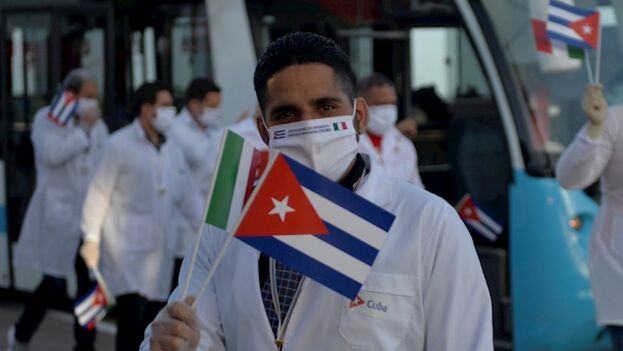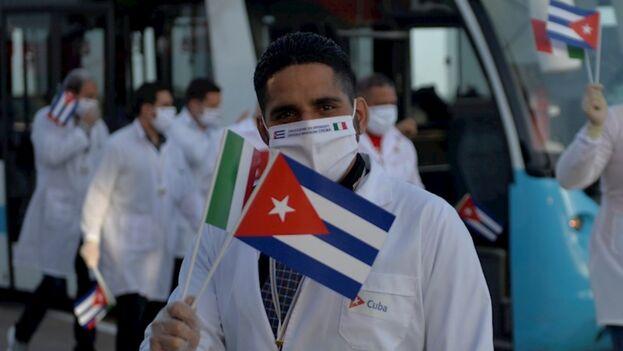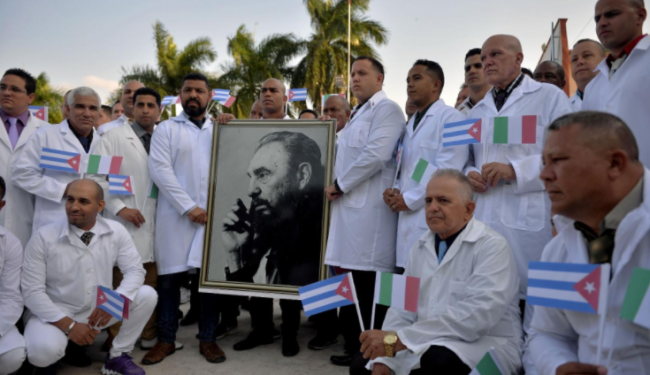After Cuban-American legislators this week asked the federal government to investigate alleged violations by Mexico of the United States–Mexico–Canada Agreement (USMCA) due to the hiring of medical personnel from Cuba in 2020, questions are being raised about the characteristics of this "medical mission" from Havana to the neighboring country.
What were the terms of the agreement between Havana and Mexico City? Were there any violations of laws governing the hiring of professionals in that country? Is it possible that the human rights provisions of the NAFTA were violated, as the legislators claim?
DIARIO DE CUBA, which closely followed this agreement to export Cuban labor, runs down what happened in those days.
Secrecy and opacity
The first thing that came to light after the announcement of the arrival of Cuban doctors in Mexico to deal with the ravages of the Covid-19 pandemic was the secrecy with which the professionals traveled to that country.
Although in April 2020 the Mexican Foreign Ministry reported the arrival of ten Cuban experts to evaluate the Covid-19 pandemic, but without providing "medical services to the population," the following month the Secretariat of Tourism of Mexico City told the EFE news agency that at least 590 Cuban doctors were already working in Mexico.
The arrival of this contingent was not mentioned by the Mexican media or by Cuban officials, while the Ministry of Foreign Affairs avoided reporting the exact number of doctors arriving in the country.
Neither did the official Cuban media, which offered daily details of the brigade that was working in Italy, and touted each group exported as an achievement of the island's health system, mention this transfer of personnel.
In June, DIARIO DE CUBA reported that a Cuban woman, a member of the brigade, had escaped from the "mission" and her whereabouts were unknown. According to the same source, since the medical workers arrived in Mexico up to that date there had been around 15 "defections," although in none of those cases were there any official reports.
This newspaper also confirmed that the hundreds of Cubans worked mainly in Mexico City and its suburbs, where the epicenter of the disease in that country was located, although it later came to light that another group of more than 100 was deployed in hospitals in Veracruz.
The crux of the matter is revealed: how much Mexico paid
Also in June, DIARIO DE CUBA had access to the export contract for the doctors, which stated that the Health Institute for Wellbeing (INSABI) and the Mexico City Government paid 6,255,792 USD for the work of 585 Cuban doctors and nurses.
On average, local authorities paid Havana 10,693 USD for each of the professionals, a source from the Mexico City government told DDC.
The Cuban professionals included specialists in General Comprehensive Medicine (family physicians), biomedical specialists, and others in critical medicine and internal medicine, as well as epidemiologists and nurses. All of these professionals were in short supply on the island when the pandemic overwhelmed health system at the beginning of 2021.
Despite the existence of the contract, in an interview with this newspaper, the Mexican capital’s Secretary of Health, Oliva López Arellano, stated that the work of the Cubans was "voluntary," and the amount of the agreement was to cover their salaries, as well as training, specialization, consulting and joint research.
The official also confirmed that the professionals were not allowed to move about freely, and blamed this on the restrictions resulting from the pandemic.
"We coordinate with the head of the brigade, with the people who are responsible. [The physicians] are basically focused on their work and, given the significant risk exposure they face, they go to their work areas and return to rest. They don't have, let's say, room to maneuver, like any doctor, nurse or nurse who is now dealing with the pandemic. All the people are like this because the risk of contagion is significant," she explained.
In July, when Mexico City ended the "mission" and the first Cubans returned to the island, López Arellano confirmed that the local government had paid 135 million Mexican pesos (more than 6,000,000 USD) for their work.
The reality of exported labor
DIARIO DE CUBA learned that, of the approximately $10,700 paid on average by the Mexican government for each of the 585 Cuban doctors and nurses, Havana only gave them $660 for three months ($220 per month). The Cuban professionals were told that the $220 they received was "for food."
DIARIO DE CUBA's sources reported the Cubans were taken, under surveillance, to Tepito, a neighborhood with a high crime rate known for its violence, but also for its streets full of tianguis (street markets) where all kinds of items can be purchased at low prices.
To confirm the exploitation scheme, reports by transparency and immigration agencies obtained by the binational platform LatinUs in September 2020 indicated that the professionals from the island worked without the required immigration documentation.
According to the investigation, the Mexican National Institute of Migration (INM) did not issue permits or receipts to verify the legal stays of the health professionals.
"From the review of the databases of migratory regulation procedures, from which information is obtained on persons who obtained residence cards (temporary, temporary student or permanent), with which they accredit a regular and documented stay in the national territory, no data was found on Cuban nationals who in May of this year had obtained any of the aforementioned documents or who, filling out the forms, indicated that they belonged to the health and assistance services sector," stated Fernando Alí Urbina, Director of Migratory Affairs Planning and Promotion.
The Cuban personnel neither entered Mexico as visitors nor filled out the corresponding immigration form, as a tourist does, according to the National Migration Institute's responses to the platform's transparency requests.
The Directorate of Airports and Maritime Ports and the Directorate of Migratory Control and Verification were unable to identify the papers with which these Cubans entered Mexico to work in public hospitals between May and July.
Although the INM pointed to Article 85 of the Immigration Law, according to which entrance into the country is to be facilitated for foreign government officials on official commissions, the entity should have complied with the immigration registration, as Article 20 of the Immigration Law obliges the Institute to monitor the exit and entry of persons to the national territory and to review their documentation.
INSABI's Programming and Budget Coordination Office was also unable to produce a copy of the agreement signed with the Government of Cuba, or any invoices, receipts or vouchers related to this agreement.
The Secretariat of Administration and Finance stated that it had no documents related to the contingency caused by Covid-19 and, therefore, had no invoices or payments made to the Cuban Government.
A year later, in September 2021, an investigation made public in Mexico revealed that the Government of that country and Havana had committed fraud by skimming 10,824,189 euros (255,873,177 Mexican pesos) from the country’s Health budget by hiring 585 doctors from the Island in 2020.
This investigation also revealed that the professionals allegedly practiced without academic degrees in that country.
According to a report filed by Julen Rementería, a Mexican senator who is a member of the National Action Party (PAN), the administration of Andrés Manuel López Obrador used public resources to pay for the brigade's services.
According to the report, which cites several official documents, including pages of the contract between Mexico City and Havana, on April 21, 2020 the local Health and Welfare Institute (INSABI) "through a 'collaboration agreement', transferred 135,875,081.52 million pesos to the Government of Mexico City to 'help' it in the Covid crisis."
The authors of the report asked the Mexican Social Security Institute (IMSS) to provide them with the amount paid in salaries to the Cuban doctors, as well as copies of their professional degrees, accreditation of their profession in Mexico, the criteria for compatibility with the profession in the country, and the medical units to which they were sent.
"The IMSS replied it was 'not authorized to provide us with this information'. This means that the IMSS accepted as 'doctors' foreigners without verifying that they were qualified and asked them to treat Covid patients in the middle of the pandemic," the report stressed.
Investigators lodged a similar request with the Institute of State Worker Security and Social Services (ISSSTE) and "the response was that 'they searched exhaustively for the information but did NOT find it'. That is, they directed the foreigners to treat Covid patients without corroborating that they were qualified to do so."
According to the investigation, the federal Ministry of Health was also unable to explain how it verified the professional capacity of the health workers, and the National Commission of Medical Arbitration (CONAMED) indicated that "they have no information either.″
Finally, "we also asked the entity that hired and paid them, which is the Government of Mexico City, which responded that they had 'no documentation that accredits those 585 people as doctors, because that is NOT their responsibility, but rather that of the Cuban Health Ministry.'"
"And that is where they contradict themselves, because in both biannual agreements, the Mexico City Health Ministry itself says that it is RESPONSIBLE for processing the permit for these people to practice as health professionals," Rementeria stressed.
The authors of the investigation underscored that, according to their research, the 585 Cubans who were working in Mexico cost the State budget 437,390 Mexican pesos (19,700 dollars) each, "while a Mexican doctor with a medical degree in our country earns some 17,000 pesos a month (765 dollars) at the IMSS, while lacking necessary resources."
The document specified that the transfer for the total amount was made "to the official accounts of the regime, not to the alleged doctors," and was made in euros.
The Mexican government denied the alleged fraud, but, at the end of 2021, National Action Party (PAN) representatives in the Mexican Senate presented before that body a proposal to set up a special commission to investigate the contracts of the Cuban doctors.
At that time, Rementería accused President Andrés Manuel López Obrador, Claudia Sheinbaum, the head of the government of the Mexican capital, and Miguel Díaz-Canel, of orchestrating a scheme in the amount of 255,873,177 pesos against the health budget by hiring 585 "fake Cuban doctors" to treat Mexican Covid-19 patients.
The legislator complained that the money paid by the medical brigade went to "the Cuban dictatorship," since the transfer of the payment of their salaries was made to the regime’s official accounts, not to the supposed doctors. "And they were paid even in EUROS," he emphasized.
"We want the records of the patients treated by these false doctors. We want to know how many Mexicans died because of this fraud. We want the families of the victims of this fraud to be compensated. We want those responsible to be held legally responsible," the legislator demanded in a message on his social networks.
The reality of the Cuban medical brigades
At the close of 2021, Cuban authorities acknowledged that human health and care services generated for the Government 3,997,948.3 of the 6,879,664.9 million pesos received in 2020 for services. Health accounted for exactly 58.1% of the services exported last year, according to the Statistical Yearbook published by the official National Statistics and Information Office (ONEI).
According to the president of Comercializadora de Servicios Médicos Cubanos, S.A., the company "wishes to continue contributing not only to the development of the national economy, with its ample sales network, which includes 150 companies in more than 50 countries, but also to access to and the coverage of health services at the international level," reported the official website of the Ministry of Public Health (MINSAP).
Meanwhile, the Vice Minister of Health, Luis Fernando Navarro, stated that in 2021 said company complied with the revenue plan at the national level, without revealing exact figures.
In addition to having to hand over at least three quarters of their salaries, Cuban health professionals sent on missions abroad are subjected to heavy surveillance and restrictions on their fundamental freedoms.
These conditions have been condemned by human rights organizations, and the UN has warned that they could constitute forms of "forced labor" and "modern slavery".


